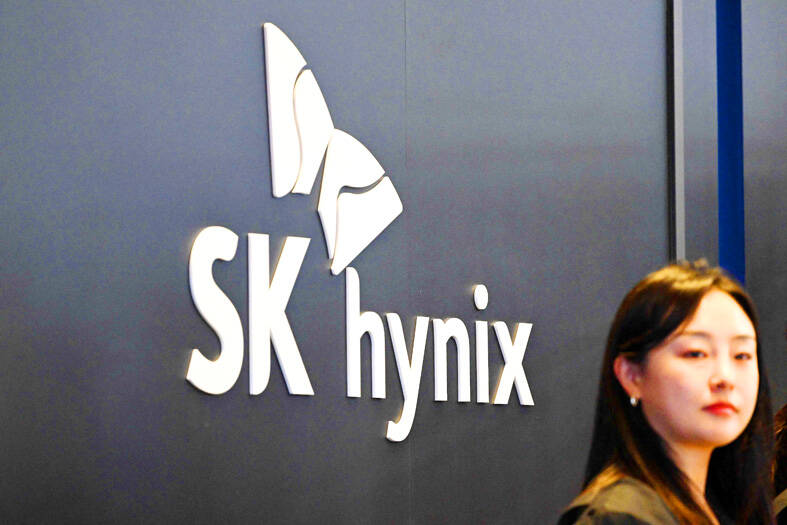South Korea’s SK Hynix Inc, the world’s second-largest maker of memory chips, yesterday said that some customers have brought forward orders in preparation for new US tariffs on semiconductors.
Speaking at the company’s annual shareholders’ meeting, SK Hynix head of global sales and marketing Lee Sang-rak said the “pull-in” effects, along with the reduction in customers’ inventory, led to favorable market conditions.
However, he added that it remains to be seen whether the trend would continue.

Photo: Jung Yeon-je, AFP
The US’ Micron Technology Inc and SanDisk Corp, and China’s Yangtze Memory Technologies Co (長江存儲) have raised their chip prices, partly due to robust demand from the artificial intelligence (AI) market, media reports said.
US President Donald Trump has said he intends to impose tariffs on imports of semiconductors and some other products “in the neighborhood of 25 percent.”
“Fears that the US may impose semiconductor tariffs in April have led to pre-emptive transfers of semiconductor inventory to the United States,” Nomura Holdings Inc said in a report this week.
“It is not yet known if the tariffs will actually be imposed; if this materializes, it could lead to higher prices for set products, which could dampen demand,” it added.
SK Hynix expects “explosive growth” in high bandwidth memory (HBM) chips demand this year, backed by investments in data centers, company CEO Kwak Noh-jung told shareholders.
In January, SK Hynix forecast that sales of its HBM chips would more than double this year.
“Our HBM sales for 2025 have already been sold out, and we plan to finalize sales with customers for the 2026 volume within the first half of this year to further strengthen revenue stability,” Kwak said.
While doubts around a slowdown in spending on AI hardware emerged in January following DeepSeek’s (深度求索) claims that it had developed AI models rivaling Western counterparts at a fraction of cost, Nvidia last month signaled that its AI chip demand was intact.
Kwak saw DeepSeek’s emergence as ultimately beneficial.
“This could likely have a positive impact on medium to long-term demand for AI memory chips. From our perspective, we don’t see DeepSeek slowing down demand for high-performance accelerators or HBM,” Kwak said.

UNCERTAINTY: Innolux activated a stringent supply chain management mechanism, as it did during the COVID-19 pandemic, to ensure optimal inventory levels for customers Flat-panel display makers AUO Corp (友達) and Innolux Corp (群創) yesterday said that about 12 to 20 percent of their display business is at risk of potential US tariffs and that they would relocate production or shipment destinations to mitigate the levies’ effects. US tariffs would have a direct impact of US$200 million on AUO’s revenue, company chairman Paul Peng (彭雙浪) told reporters on the sidelines of the Touch Taiwan trade show in Taipei yesterday. That would make up about 12 percent of the company’s overall revenue. To cope with the tariff uncertainty, AUO plans to allocate its production to manufacturing facilities in

Taiwan will prioritize the development of silicon photonics by taking advantage of its strength in the semiconductor industry to build another shield to protect the local economy, National Development Council (NDC) Minister Paul Liu (劉鏡清) said yesterday. Speaking at a meeting of the legislature’s Economics Committee, Liu said Taiwan already has the artificial intelligence (AI) industry as a shield, after the semiconductor industry, to safeguard the country, and is looking at new unique fields to build more economic shields. While Taiwan will further strengthen its existing shields, over the longer term, the country is determined to focus on such potential segments as

TAKING STOCK: A Taiwanese cookware firm in Vietnam urged customers to assess inventory or place orders early so shipments can reach the US while tariffs are paused Taiwanese businesses in Vietnam are exploring alternatives after the White House imposed a 46 percent import duty on Vietnamese goods, following US President Donald Trump’s announcement of “reciprocal” tariffs on the US’ trading partners. Lo Shih-liang (羅世良), chairman of Brico Industry Co (裕茂工業), a Taiwanese company that manufactures cast iron cookware and stove components in Vietnam, said that more than 40 percent of his business was tied to the US market, describing the constant US policy shifts as an emotional roller coaster. “I work during the day and stay up all night watching the news. I’ve been following US news until 3am

COLLABORATION: Given Taiwan’s key position in global supply chains, the US firm is discussing strategies with local partners and clients to deal with global uncertainties Advanced Micro Devices Inc (AMD) yesterday said it is meeting with local ecosystem partners, including Taiwan Semiconductor Manufacturing Co (TSMC, 台積電), to discuss strategies, including long-term manufacturing, to navigate uncertainties such as US tariffs, as Taiwan occupies an important position in global supply chains. AMD chief executive officer Lisa Su (蘇姿丰) told reporters that Taiwan is an important part of the chip designer’s ecosystem and she is discussing with partners and customers in Taiwan to forge strong collaborations on different areas during this critical period. AMD has just become the first artificial-intelligence (AI) server chip customer of TSMC to utilize its advanced